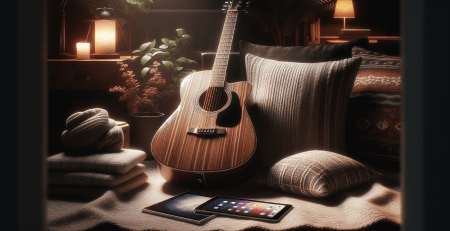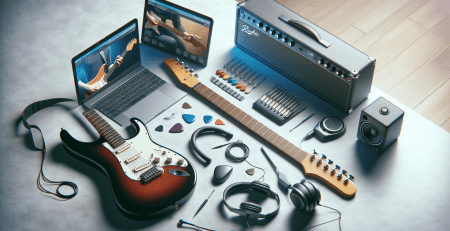How To Stay Motivated While Learning Guitar Online
Learning guitar online can be an incredibly rewarding experience, but staying motivated throughout the process can sometimes be a challenge. “How To Stay Motivated While Learning Guitar Online” offers you practical tips and inspiring advice to keep you engaged and excited as you navigate the world of virtual guitar lessons. This guide will help you set achievable goals, create a consistent practice routine, and connect with like-minded musicians, ensuring that your passion for music remains strong and vibrant. Have you ever started learning something new with excitement, only to find yourself struggling to stay motivated after a while? If you’re learning to play the guitar online and feeling a bit stuck, you’re not alone. Many people face this challenge. But don’t worry! This guide will help you stay motivated and make your online guitar learning journey more enjoyable and rewarding.

Setting Clear Goals
Why Goals Matter
Setting clear and achievable goals is the backbone of staying motivated. Without them, it’s easy to lose direction and enthusiasm. Think of goals as the landmarks on your path to becoming a proficient guitarist.
Types of Goals
There are different types of goals you can set, and it’s essential to have a mix of them. Here are a few examples:
| Long-Term Goals | Short-Term Goals | Micro Goals |
|---|---|---|
| Perform at a local gig. | Learn a new song by the end of the week. | Practice a difficult chord progression for 10 minutes daily. |
| Finish an online guitar course. | Master a specific skill, like fingerpicking, within a month. | Spend 5 minutes on warm-up exercises every session. |
How to Set SMART Goals
SMART goals are Specific, Measurable, Achievable, Relevant, and Time-bound. This framework ensures your objectives are clear and attainable. For example, instead of saying, “I want to get better at guitar,” you might set a SMART goal like, “I want to be able to play ‘Wonderwall’ by Oasis perfectly within a month.”
Creating a Practice Schedule
Importance of Routine
Consistency is key when it comes to learning any new skill. By establishing a regular practice routine, you condition yourself to become more disciplined, which can significantly enhance your progress.
How to Structure Your Practice Sessions
Creating a balanced and effective practice session involves a variety of activities. Here’s a sample structure:
| Activity | Time Allocated |
|---|---|
| Warm-Up Exercises | 10 minutes |
| Technique Practice | 15 minutes |
| Learning New Material | 20 minutes |
| Fun Play/Improvisation | 15 minutes |
| Cool Down/Stretching | 5 minutes |
Adapting Your Schedule to Fit Your Life
Everyone’s life is different, with varying levels of free time. It’s essential to create a practice schedule that is realistic for you. If you’re a busy individual, even 20 minutes a day can be incredibly productive if you focus on quality.
Finding the Right Online Resources
Types of Online Learning Platforms
The internet is teeming with resources, but finding the right ones can be overwhelming. Here are the main types you’ll encounter:
| Type | Description |
|---|---|
| Video Tutorials | Pre-recorded lessons by experts. Examples include YouTube, Udemy, and Coursera. |
| Interactive Platforms | Websites with guided lessons and instant feedback, such as Yousician and JustinGuitar. |
| Sheet Music/TABs | Libraries of songs in sheet music or tablature form, like Ultimate Guitar. |
| Community Forums | Platforms where you can ask questions and share experiences, such as Reddit and GuitarForums. |
Evaluating Resources
Not all resources are created equal. When selecting your tools, consider the following criteria:
- Accuracy: Ensure that the information is correct.
- Reputation: Check reviews and recommendations.
- Quality of Instruction: Evaluate the teaching style and clarity of explanations.
- Engagement: Look for interactive features that keep you engaged.
Staying Engaged During Practice
Mixing Up Your Routine
It’s natural to get bored if you’re doing the same thing every day. Mix up your practice routine to keep things fresh. Alternate between practicing scales, learning new songs, and improvising.
Using Backing Tracks
Playing along with backing tracks can transform your practice sessions. It makes you feel like you’re part of a band and helps to improve your timing and rhythm. Websites like JamTracks and apps like iReal Pro offer a wide range of backing tracks for various genres.
Recording Yourself
Recording your practice sessions allows you to track your progress and identify areas for improvement. You don’t need professional equipment; a smartphone will do just fine. Listening back can be motivating as you can hear how much you’ve improved over time.
Joining Online Communities
Benefits of a Community
Being part of an online community can provide you with support, encouragement, and inspiration. It’s reassuring to know that you’re not alone in your struggles and triumphs.
Popular Guitar Communities
Here are some well-known online guitar communities where you can interact with fellow learners:
| Platform | Description |
|---|---|
| Subreddits like r/guitar and r/GuitarLessons offer advice, song recommendations, and more. | |
| Groups such as “Guitar Beginners” and “Daily Guitar Practice” provide a space to share progress and ask for tips. | |
| Guitar Forums | Websites like Ultimate Guitar Forum and Guitar Tricks Forum are dedicated to guitar discussion and learning. |
Participating in Challenges and Contests
Many online communities organize challenges and contests. Participating in these events can give you a goal to work toward and add a fun element to your practice.
Rewarding Yourself
Celebrating Milestones
Rewarding yourself for achieving your goals can be highly motivating. Celebrate your milestones, no matter how small they might seem. Finished learning a challenging song? Treat yourself to a new set of strings or a guitar pick.
Setting Up a Reward System
Develop a reward system that excites you. For instance, after completing a certain number of practice hours, allow yourself to buy a new guitar accessory or take a day off to watch your favorite concert video.

Overcoming Plateaus
Understanding Plateaus
Everyone hits plateaus where progress seems to stall. It’s a normal part of the learning process, but it can be disheartening if you don’t know how to handle it.
Strategies to Push Forward
- Change Your Material: Sometimes, trying a new genre or style can reignite your interest and drive.
- Focus on Fundamentals: Go back to basics and strengthen your foundational skills.
- Get Feedback: Ask for feedback from a teacher or a more experienced player. They might offer insights you’ve overlooked.
Using Technology to Your Advantage
Guitar Learning Apps
There are many apps designed to make learning guitar easier and more enjoyable. Here are some top picks:
| App Name | Description |
|---|---|
| Fender Play | Guided lessons for various skill levels with a structured curriculum. |
| Yousician | Interactive platform offering instant feedback. |
| GuitarTuna | A tunable app that also includes chord charts and games. |
Tools for Practice
Utilizing technology can help you practice more effectively. Tools like metronomes, tuners, and chord libraries can be invaluable.
| Tool | Description |
|---|---|
| Metronome | Helps you maintain a consistent tempo. Apps like Pro Metronome are user-friendly. |
| Tuner | Ensures your guitar is in tune for optimal sound. Clip-on tuners or apps like GuitarTuna are great options. |
| Chord Library | Provides diagrams and variations for chords. Websites like Chordify are very useful. |
Maintaining Physical and Mental Health
Importance of Physical Health
Playing the guitar requires specific physical actions. Neglecting your health can hinder your progress and potentially lead to injuries.
Stretching and Warm-Up Exercises
Before diving into practice, make sure to stretch and warm up your hands, wrists, and fingers. Simple exercises can prevent strains and improve flexibility.
Mental Well-being
Learning an instrument can be mentally challenging. It’s essential to keep a positive mindset to stay motivated.
Taking Breaks
Don’t push yourself too hard. Taking regular breaks can prevent burnout and keep you fresh. A good rule of thumb is to take a 5-minute break every half-hour of practice.
Mindfulness and Stress Relief
Engaging in mindfulness practices like meditation can help you stay focused and reduce stress. Playing guitar should be a source of joy, not frustration.
Seeking Feedback and Guidance
The Role of Feedback
Constructive feedback can be incredibly beneficial. It can provide you with new perspectives and pinpoint areas for improvement.
Where to Find Feedback
- Online Instructors: Many online courses offer feedback from instructors.
- Peer Reviews: Posting your progress in online communities can get you valuable input.
- Self-evaluation: Recording and critically reviewing your own practice sessions can offer significant insights.
Keeping a Practice Journal
Benefits of Journaling
Keeping a practice journal can help you track your progress, identify patterns, and stay motivated. It also makes it easier to set and achieve your goals.
What to Include
Your practice journal can include:
- Daily Practice Logs: Note what you practiced, for how long, and any observations.
- Goals and Achievements: Document your goals and the steps you’ve taken to achieve them.
- Challenges: Write about any difficulties you encounter and possible solutions.
Reviewing Your Journal
Regularly reviewing your journal helps you see how far you’ve come and can provide motivation during challenging times.
Understanding Your Learning Style
Identifying Your Learning Style
Everyone has a unique way of learning. Identifying your learning style can make your practice sessions more effective.
| Learning Style | Characteristics |
|---|---|
| Visual | Learns best through seeing (charts, videos, diagrams). |
| Auditory | Learns best through hearing (listening to instructions, playing along with tracks). |
| Kinesthetic | Learns best through doing (hands-on practice, experimenting). |
Adapting Practice to Your Style
Tailor your practice sessions to fit your learning style. If you’re a visual learner, use diagrams and videos. If you’re an auditory learner, focus on listening exercises. Kinesthetic learners should prioritize hands-on practice.
Exploring Different Genres
Benefits of Genre Diversity
Sticking to one genre can become monotonous. Exploring different musical styles can keep things exciting and broaden your skills.
How to Incorporate New Genres
Start by listening to music from various genres and identifying what excites you. Try learning songs or techniques from those styles and incorporating them into your practice routine.
Final Thoughts
Staying motivated while learning guitar online is entirely possible with the right strategies in place. By setting clear goals, creating an engaging practice routine, using technology to your advantage, and maintaining your physical and mental health, you can make your guitar learning journey a joyful and rewarding experience.
Remember, every guitarist started where you are now. With consistent effort and a positive attitude, you’ll find yourself strumming your favorite songs and even creating your own music in no time. Keep playing, stay motivated, and most importantly, have fun!
So, are you ready to pick up that guitar and get practicing? Your musical journey awaits!










Leave a Reply